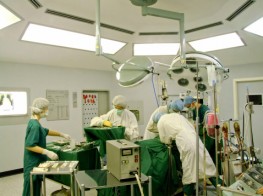Quality of Hospital Care To Blame for Disparity in Surgical Outcomes, Rather than Patients’ Income
11April2014
11April2014

It is well-established that patients from lower social economic backgrounds tend to have worse outcomes after surgery than wealthier patients. But the explanation for the poorer outcomes has not been well understood. According to new research published in JAMA Surgery, the problem may be a lower quality of care in hospitals that serve primarily poor patients.
Earlier studies have linked a person’s risk of dying after undergoing major cancer surgery to his or her socioeconomic status. For instance, the risk of fatality for a poor patient who had stomach surgery to treat cancer is approximately 50% higher than that for a wealthy person who underwent the same surgery.
To conduct the new study, researchers at the Center for Healthcare Outcomes and Policy at the University of Michigan analyzed the records of more than 596,000 patients ages 65 and older who underwent major cancer surgery from 2003 through 2007. They used U.S. Census data to determine the socioeconomic status of the patients and found that the poorest patients were more likely to die after experiencing surgical complications.
The quality of care at the hospital where the surgery was conducted may play a significant role in medical complications and patient survival rates.
The term “failure to rescue” applies to the inability to save a patient from death after a major complication occurs. The researchers found that poorer patients had higher rates of failure to rescue than wealthier patients. The researchers found that the disparity may be related to how well a hospital recognizes and treats complications when they arise.
Overall, the researchers found that approximately 27 percent of the poorest patients were recorded as failures to rescue, compared with approximately 20 percent of the richest patients. Overall, patients from lower social economic strata were approximately 20 percent more likely to be classified as failures to rescue.
But after adjusting for the hospitals where the procedures were performed, the researchers found that most of the increased risk among poor patients disappeared.
The likelihood of a patient dying after surgery was highest in hospitals that served mostly patients from lower socioeconomic groups. The researchers found that even wealthy patients at hospitals treating primarily poor patients tended to fare worse after cancer surgeries.
The researchers said it’s likely that a combination of hospital resources and attitudes allows hospital staff to respond effectively when medical complications occur. If a patient develops complications after surgery, survival can depend on how quickly the hospital staff recognize the problem and respond.
The attorneys of Morrow Kidman Tinker Macey-Cushman, PLLC represent patients who have been harmed by preventable medical errors in Seattle and across Washington.